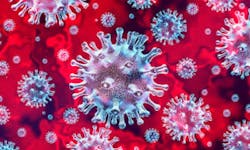OGUK pushing offshore sector testing, continued government assistance
Offshore staff
ABERDEEN, UK – Oil and Gas UK (OGUK) continues to press Britain’s government for coronavirus testing of offshore personnel.
The government has pledged to ramp up swab testing of critical workers by the end of this month, and the association is stating the case for offshore staff to be considered as among the most critical workers, behind the front line in the National Health Service.
As for the possible development of an antibody test to determine whether recovered individuals have immunity to the virus, although no procedure has yet to be validated, the association wants offshore workers to be high on the list when this does become available, said OGUK health and safety director Trevor Stapleton.
“Some of our member companies are considering arranging their own COVID-19 testing outside the NHS’ service, although this would have to be performed to qualified standards.”
In the case of offshore passengers travelling to and from installations on helicopters, OGUK’s preferred option is for individuals to wear snoods over simple face masks. “We like snoods because they remain comfortable to wear at all times,” he explained, “and are comfortable to use, but don’t conflict with emergency breathing equipment.”
At the same time, the association and helicopter providers are working to ensure optimum protection for the air crews, with barriers in place to separate them from the passengers, as many crews are working on flights all day long. Where possible, the aircraft owners are trying to remove some of the seating to ensure safer distancing between passengers.
OGUK continues to advise its members to operate minimum manning on offshore installations where possible, although that decision is ultimately up to the individual operator, Stapleton stressed. Individuals responsible for the most critical tasks should ideally be housed in single-occupancy cabins, he added.
“There must also be a focus on individual hygiene - just because staff are offshore, that doesn’t mean they shouldn’t still be washing their hands frequently.”
Matt Abraham, OGUK’s supply chain director, said his team was working with the Confederation of British Industries on applying the government’s job retention scheme for people employed in Britain’s oil and gas sector generally. Under the present arrangement, known as ‘furloughing’, the government has agreed to temporarily cover 80% of wages (up to a certain level) of staff of companies unable to maintain normal service in the current climate.
The arrangement as it stands is due to end next month, but consultations have started on an extension. “We’d ideally like the extension to be implemented sooner rather than later,” Abraham said, “as our companies have to plan for the future, and we want the extension to last for a significant period of time.”
One suggestion has been for a rolling extension, ideally lasting nine to 12 months, to cover the full impact that COVID-19 and the downturn in demand for oil are having on the whole of the industry.
However, some members have raised concerns as to whether the oil and gas sector is eligible to claim, as the oil price issue could be considered separate to COVID-19.
One positive has been the government’s recent decision to extend help to companies with turnover of up to £500 million ($625 million). Abraham said OGUK has also been investigating other types of loan schemes to help its members keep themselves afloat.
Transportation hurdles for critical equipment items for delivery offshore have eased. “There are still some delays, but they are not as bad as we first thought.”
However, the UK’s oil and gas supply chain is going through a really tough time, he warned, not helped by INEOS’ decision to postpone until 2021 its annual shutdown of the offshore Forties Pipeline System that transports oil from so many North Sea fields to eastern Scotland. “And nobody thinks things will get better soon.”
04/21/2020
